Related Research Articles
Country is a music genre originating in the southern regions of the United States, both the American South and the Southwest. First produced in the 1920s, country music is primarily focused on singing stories about working-class and blue-collar American life.
Alternative country is a loosely defined subgenre of country music and/or country rock that includes acts that differ significantly in style from mainstream country music, mainstream country rock, and country pop. Alternative country artists are often influenced by alternative rock. Most frequently, the term has been used to describe certain country music and country rock bands and artists that are also defined as or have incorporated influences from alternative rock, indie rock, punk rock, heartland rock, Southern rock, progressive country, outlaw country, neotraditional country, Texas country, Red Dirt, roots rock, indie folk, folk rock, rockabilly, bluegrass, and honky tonk.

The Carter Family was a traditional American folk music group that recorded between 1927 and 1956. Their music had a profound influence on bluegrass, country, Southern Gospel, pop and rock music, as well as on the U.S. folk revival of the 1960s.

"Mother" Maybelle Carter was an American country musician and "among the first" to use the Carter scratch, with which she "helped to turn the guitar into a lead instrument." It was named after her. She was a member of the original Carter Family act from the late 1920s until the early 1940s and a member of the Carter Sisters and Mother Maybelle group.

"The Great Rock Island Route", popularized as "Wabash Cannonball" and also known by various other titles, is a 19th-century American folk song that describes the scenic beauty and predicaments of a fictional train, the Wabash Cannonball Express, as it travels on the Chicago, Rock Island and Pacific Railroad. The song has become a country music and marching band staple. The only train to actually bear the name was created in response to the song's popularity, the Wabash Railroad renaming its daytime express service between Detroit and St. Louis the Wabash Cannon Ball from 1949 until its discontinuation in 1971 during the formation of Amtrak.
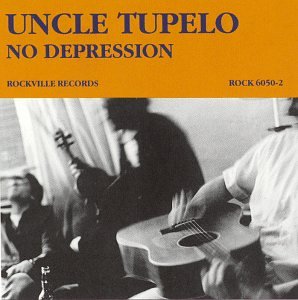
No Depression is the first studio album by alternative country band Uncle Tupelo, released in June 1990. After its formation in the late 1980s, Uncle Tupelo recorded the Not Forever, Just for Now demo tape, which received a positive review by the College Media Journal in 1989. The review led to the band's signing with what would become Rockville Records later that year. The album was recorded with producers Sean Slade and Paul Q. Kolderie at Fort Apache Studios, on a budget of US$3,500.
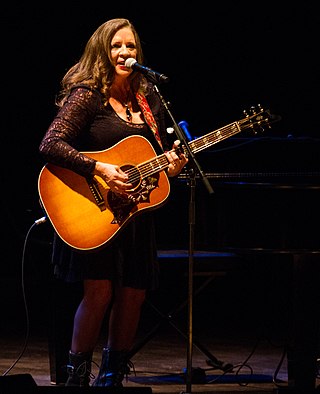
Carlene Carter is an American country music singer and songwriter. She is the daughter of June Carter Cash and her first husband, Carl Smith.
"Corrine, Corrina" is a 12-bar country blues song in the AAB form. "Corrine, Corrina" was first recorded by Bo Carter. However, it was not copyrighted until 1932 by Bo Carter, along with his publishers Mitchell Parish and J. Mayo Williams.
"Engine One-Forty-Three" is a folk ballad in the tradition of Anglo-American train wreck songs. It is based on the true story of the wreck of the Chesapeake and Ohio Railway's Fast Flying Virginian (FFV) near Hinton, West Virginia in 1890.

Orange Blossom Special is the 21st album released by musician Johnny Cash on Columbia Records in 1965. The recordings include country and folk standards, such as "The Long Black Veil", "When It's Springtime in Alaska", "Danny Boy" and "Wildwood Flower".
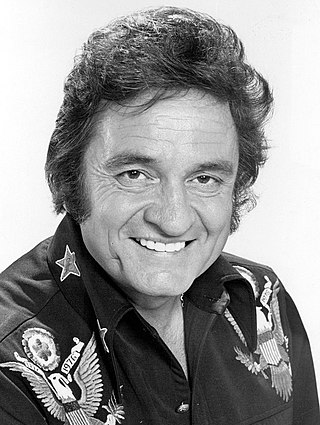
John R. Cash was an American singer-songwriter. Most of Cash's music contains themes of sorrow, moral tribulation, and redemption, especially songs from the later stages of his career. He was known for his deep, calm, bass-baritone voice, the distinctive sound of his backing band, the Tennessee Three, that was characterized by its train-like chugging guitar rhythms, a rebelliousness coupled with an increasingly somber and humble demeanor, and his free prison concerts. Cash wore a trademark all-black stage wardrobe, which earned him the nickname "Man in Black".

Harry Smith's Anthology of American Folk Music, Volume 4 is a two-disc compilation of twenty-eight American folk recordings originally released on 78 rpm records between 1927 and 1940, issued in May 2000 on Revenant Records, catalogue #211. Compiled by experimental filmmaker and notable eccentric Harry Smith as the fourth album of his Anthology of American Folk Music set from 1952, it was never completed by Smith himself. While the CD is out of print, an LP version has been issued, along with the other three volumes, on the Portland-based Mississippi Records label.
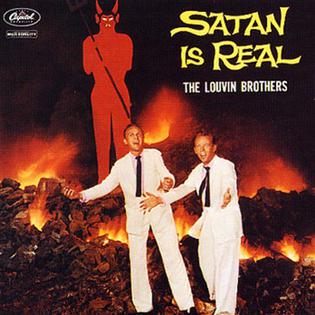
Satan Is Real is a gospel bluegrass album by American country music duo The Louvin Brothers, released in 1959.

When the Roses Bloom in Dixieland: Their Complete Victor Recordings (1929–1930) is a compilation of recordings made by American country music group the Carter Family, released in 1995. It is the third of nine compilations released by Rounder Records of the group's Victor recordings. The original Carter Family group consisting of Alvin Pleasant "A.P." Delaney Carter, his wife Sara Dougherty Carter, and his sister-in-law Maybelle Addington Carter recorded many of what would become their signature songs for Victor Records.

Worried Man Blues: Their Complete Victor Recordings (1930) is a compilation of recordings made by American country music group the Carter Family, released in 1995. It is the fourth of nine compilations released by Rounder Records of the group's Victor recordings.

Sunshine in the Shadows: Their Complete Victor Recordings (1931–1932) is a compilation of recordings made by American country music group the Carter Family, released in 1996. It is the fifth of nine compilations released by Rounder Records of the group's Victor recordings. The original Carter Family group consisting of Alvin Pleasant "A.P." Delaney Carter, his wife Sara Dougherty Carter, and his sister-in-law Maybelle Addington Carter recorded many of what would become their signature songs for Victor Records.

Give Me the Roses While I Live: Their Complete Victor Recordings (1932–1933) is a compilation of recordings made by American country music group the Carter Family, released in 1997. It is the sixth of nine compilations released by Rounder Records of the group's Victor recordings. The original Carter Family group consisting of Alvin Pleasant "A.P." Delaney Carter, his wife Sara Dougherty Carter, and his sister-in-law Maybelle Addington Carter recorded many of what would become their signature songs for Victor Records.
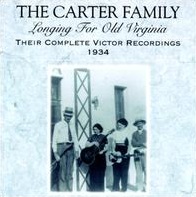
Longing for Old Virginia: Their Complete Victor Recordings (1934) is a compilation of recordings made by American country music group the Carter Family, released in 1998. It is the eighth of nine compilations released by Rounder Records of the group's Victor recordings. The original Carter Family group consisting of Alvin Pleasant "A.P." Delaney Carter, his wife Sara Dougherty Carter, and his sister-in-law Maybelle Addington Carter recorded many of what would become their signature songs for Victor Records.

Last Sessions: Their Complete Victor Recordings (1934–1941) is a compilation of recordings made by American country music group the Carter Family, released in 1998. It is the final of nine compilations released by Rounder Records of the group's Victor recordings. The original Carter Family group consisting of Alvin Pleasant "A.P." Delaney Carter, his wife Sara Dougherty Carter, and his sister-in-law Maybelle Addington Carter recorded many of what would become their signature songs for Victor Records.
"I'm Thinking Tonight of My Blue Eyes" is the title of a country/folk song by A. P. Carter. A. P. Carter was a collector of old songs and lyrics. I'm Thinking Tonight of My Blue Eyes is one of these old songs he discovered and it is said to be adapted from "The Prisoner's Song" by Guy Massey. The song is a hillbilly folk song, the foundation of early country music. The song became a hit in 1929. The song is a sad tale of a love that had been lost far across the sea, set to traditional English folk music.
Due to the song's popularity and historical importance, many have covered the song, including Bing Crosby, Gene Autry, Burl Ives and The Andrews Sisters. Some artists shorten the title to Broken Ties or Broken Vows or Broken Hearted Lovers. In February 1939 on XET Station, Mexico, Sara Carter dedicated the song to her long lost boyfriend Coy Bayes, who was in California at the time. On February 20, 1939 Sara Carter and Coy Bayes married at Brackettville, Texas. Mother Maybelle used the Carter Family picking on the song, which was new at the time, the bass notes are played with her thumb and she strums with her other fingers. The song was later put on the Carter Family album: My Clinch Mountain Home: Their Complete Victor Recordings (1928–1929). Ralph Stanley in 2006 recorded a complete album of Carter Family songs, including "I'm Thinking Tonight of My Blue Eyes", titled A Distant Land to Roam: Songs of the Carter Family.
References
- ↑ Bill C. Malone (2001). Don't Get Above Your Raisin': Country Music and the Southern Working Class. University of Illinois Press. ISBN 0-252-02678-0.
- ↑ No Depression Movement from the Survey of American Popular Music by Frank Hoffmann and modified for the web by Robert Birkline